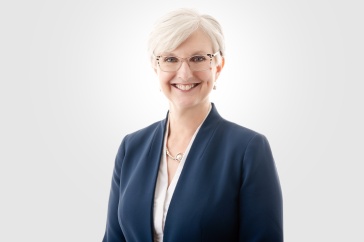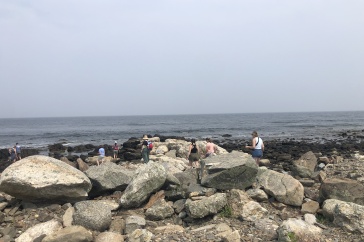
Elizabeth Chilton, who will become the 21st president of the University of New Hampshire beginning July 1, was a first-generation college student before that designation became so ingrained in the public lexicon.
“I didn’t hear the term ‘first-gen’ until I was a department chair and full professor,” Chilton says. “When I heard the term, a giant light bulb went on over my head and I thought, ‘Oh, I’m a first-generation college graduate.’”
Her experience as a first-generation student, though unrecognized at the time, played a major role in shaping Chilton as a student and later as a professor and administrator in higher education. And it ultimately helped sharpen her commitment to the inclusive and supportive atmosphere she wants to promote at UNH.
“It helped me understand, retrospectively, what the barriers were for me,” Chilton says of her reflection on the transition to college. “It has made me more sensitive to building cultures of belonging for all students, regardless of their backgrounds.”
Chilton was announced as the next UNH president May 7, having most recently served as the inaugural chancellor of Washington State University’s Pullman campus. She was appointed to the chancellor position in 2022 after joining WSU in 2020 as provost and executive vice president of the WSU system.
Along with being a first-generation student, Chilton is a graduate of public universities and has been an ardent advocate for public higher education throughout her career. She is deeply committed to access and the importance of a liberal arts education, and says she was drawn to UNH’s unique balance of excellence in research and commitment to a transformational undergraduate experience.
"I don't think she was out to find a position just to be a president of any university. I think she really wanted to be president of UNH."
“She immediately described how she was drawn to UNH’s commitment to student success, and I believe that she shares the same values that we have here,” says Jamie Burnett ‘95, ‘96G, ‘98G, chair of the presidential search committee and vice-chair of the University System of New Hampshire Board of Trustees. “I don't think she was out to find a position just to be a president of any university. I think she really wanted to be president of UNH.”
UNH represents something of a regional homecoming for Chilton, who is a native of the Northeast and earned her master’s and Ph.D. in anthropology from the University of Massachusetts Amherst, where she later spent 16 years in a variety of roles, including professor, anthropology department chair and associate vice chancellor for research and engagement.
She joins UNH at a challenging time for colleges and universities and believes one of the most critical issues to tackle is the “value proposition for higher education,” which has come under increasing scrutiny.
“The enrollment and financial challenges we're seeing all stem from the fact that there is a questioning of whether college is worth it,” Chilton says. “Those of us in higher education know that there are financial, overall wellness and life-satisfaction benefits for individuals, and there are societal benefits in terms of educating an engaged citizenry. But we have to get that message out there.”
Chilton is an anthropologist with a deep appreciation for the impact of research on the student experience. She calls it “that superpower that allows students to be involved in the creation of knowledge” and emphasizes that “public universities with the access and affordability and the opportunities for research can really change people’s lives.”
She hopes to lean on that background in anthropology to get to know the UNH community better, too.
“Every university has its own culture, has its own history, its own context. So those first few months, it’s going to be a deep ethnographic dive into really understanding both the quantitative and qualitative data about the university,” she says. “I want to get to know the people here, learn what is important to our students, and get to know what the needs of UNH and what the needs of the state and its communities are.”
"I want to get to know the people here, learn what is important to our students, and get to know what the needs of UNH and what the needs of the state and its communities are."
From there, Chilton says, the focus will shift to the university’s strategic plan, identifying priorities and “making sure we have the resources to attain them.”
Chilton will be moving to Durham with her husband, Michael Sugerman, and their three dogs. Their son, Emmet, will be about two hours away – a welcome change in proximity from her previous location in the Pacific Northwest – and she and Michael have numerous other friends and family members who will be close by.
An avid hiker, kayaker and canoeist, she says she is looking forward to exploring the surroundings and finding new favorite trails and recreation locations. Fitness is an important part of her routine, she says, as exercise – be it yoga, rowing, weight training or another activity – is a daily priority.
Among her hobbies, choral singing is a true passion, and she say she expects to seek out opportunities to participate in the local community.
“As soon as I get the chance, I’m going to be looking for a new choir to join here in the Durham area,” she says.
That sense of community is one of the primary things that drew Chilton to UNH, and she says she’s truly looking forward to fully immersing herself in the UNH environment as she helps shape the vision of the university’s future.
“Throughout the interview process, I kept hearing people use the word and emphasize the importance of the community,” Chilton says. “I think that emphasis on community and culture and impact and serving the needs of the state, those are the things that really stood out to me.”
-
Written By:
Keith Testa | UNH Marketing | keith.testa@unh.edu


















































